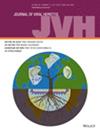Evaluation of Hepatitis C Virus Transmission Through Endoscopy Procedures in the Country of Georgia
Abstract
Exposure to healthcare procedures might be a source of hepatitis C virus (HCV) transmission in Georgia, one of the few countries currently on track to eliminate hepatitis C. While there has been a history of iatrogenic transmission of HCV, the risk of HCV transmission related to endoscopic procedures has not been previously assessed in Georgia. The goal of this study was to assess HCV seroconversion among individuals undergoing endoscopic procedures to estimate the relative role and incidence of HCV infection attributable to endoscopic procedures. A prospective cohort study was conducted in four endoscopy units in two cities (Tbilisi and Kutaisi) of Georgia during April–September, 2021. Recruitment of study participants was conducted using convenience sampling, and every eligible patient was approached and invited to participate in the study. Study population included adults (age ≥ 18 years) who received an endoscopic procedure (gastroscopy, colonoscopy and bronchoscopy) in inpatient or outpatient unit at the study sites. HCV antibody (anti-HCV) testing was conducted using rapid diagnostic test (RDT) on the same day they underwent the endoscopic procedure. Patients with a non-reactive anti-HCV baseline test were retested after 6 months. Patients with reactive baseline tests were excluded from the study and linked to further testing and care. Participants with a reactive result on follow-up RDTs were retested using a lab-based anti-HCV and HCV ribonucleic acid (RNA) test. A total of 981 HCV antibody non-reactive participants were enrolled; 590 (64.8%) of them were reached and retested after 6 months. At retesting, two out of 590 (0.3%) individuals had a reactive anti-HCV result on RDT and both were negative on laboratory-based anti-HCV and HCV RNA tests. Based on the results of this study, endoscopic procedures were not shown to contribute to HCV transmission in Georgia.

 求助内容:
求助内容: 应助结果提醒方式:
应助结果提醒方式:


